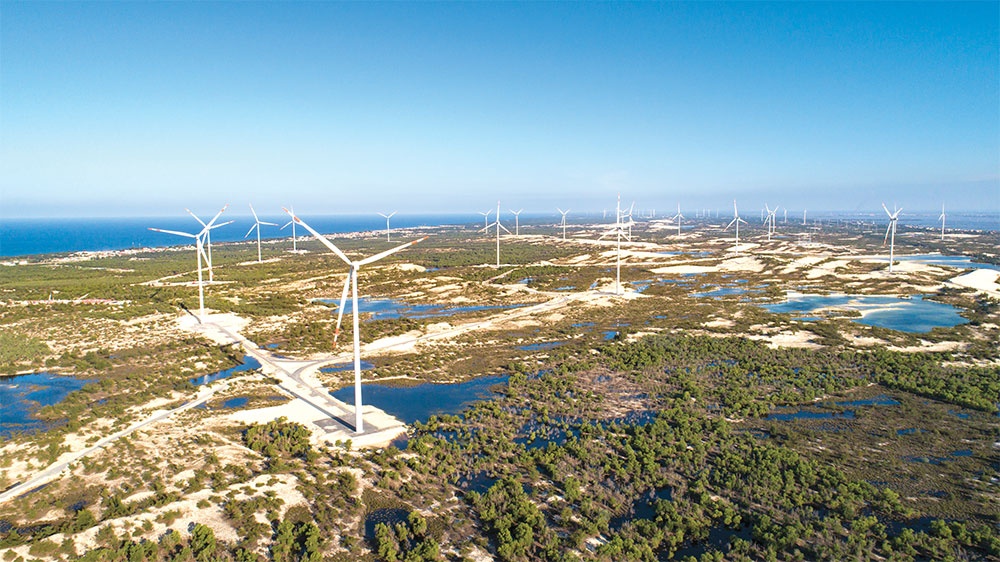
In light of Quang Binh’s master planning for the decade and beyond, approved in April, Hon La Economic Zone (EZ) is to play a crucial role in the development of the province as it is set as the growth driver alongside Phong Nha-Ke Bang National Park.
Located in the northeast of Quang Trach district, Hon La EZ has a total area of 10,000 hectares, of which the mainland spans 8,900ha and the rest is water surface.
Established in 2008, Hon La EZ is envisioned to become a general zone with key industries as power production, shipbuilding, cement, and glass production along with other supporting industries. In addition, the EZ also focuses on developing tourism and urban areas, particularly logistics services associated with Hon La Port.
Experts believe that Hon La EZ has many advantages for economic development when converging the North-South and East-West trunk roads with rail, waterway, roadway, and air routes. It also provides the gateway to the sea and the shortest path to Thailand’s northeastern provinces.
In particular, possessing Hon La Port and relatively abundant land located in the common development space with Vung Ang EZ in the nearby province of Ha Tinh, Hon La EZ has rosy prospects for investment attraction in supporting industries development and manufacturing, especially in the energy sector.
According to Quang Binh Economic Zones Management Board, Hon La EZ has attracted 68 projects with registered capital approximating $4.65 billion. Some eminent projects are Quang Trach Power Centre (including Quang Trach I and II projects), Hon La Port, DKC Hon La petroleum depot, and Vung Chua-Yen Island Sun Spa resort, among others.
The growth engine
At Hon La EZ, Quang Binh is focused on developing power production and distribution by ensuring the progress of projects such as the Quang Trach I thermal power plant, which put its turbine group 1 into operation earlier this year. Turbine group 2 is slated to come on stream in 2024. The Quang Trach II thermal power plant’s turbine group 1 is slated to start operation in 2027 and group 2 in 2028, while other renewable energy projects will be established in accordance to the nation’s power plan.
During a visit and working session at Hon La EZ in April, Chairman of the Central Economic Commission (CEC) Tran Tuan Anh praised Hon La EZ for having great potential for the development of clean energy, especially regarding offshore wind power.
Tuan Anh suggested Quang Binh’s management authorities create more favourable advantages for potential investors to come for survey. At the same time, the province needs to submit reports to the government and the CEC to study, coordinate and fully assess the potential for wind power, particularly offshore wind power development at Hon La EZ.
According to Quang Binh Economic Zones Management Board, to best avail of its advantages, the EZ cannot stand alone but must attach development to the common development space of the region, besides perfecting the internal infrastructure.
Accordingly, Hon La EZ is associated with the common development space of Vung Ang EZ in Ha Tinh province; with the National Highway No.12A’s economic corridor in which Hon La Port is the starting point; with Phong Nha-Ke Bang; as well as with countries in the Mekong sub-region along the East-West economic corridor.
Assessing Hon La EZ, Secretary of Quang Binh Party Committee Vu Dai Thang said that the province is located in an area with robust industrial development, covering Thanh Hoa, Ha Tinh, and Nghe An provinces.
“Vung Ang and Hon La EZs are located next to each other, making it possible to form a common space for economic development, with the core being the Ha Tinh Formosa complex and new factories currently under construction such as Vingroup’s battery plant. Quang Binh and the EZ will inherit not only from on-site investment activities but also from Vung Ang EZ in Ha Tinh. By contrast, the province would also support Ha Tinh in terms of infrastructure,” said Thang.
The appeal of energy investment
Tran Thang, Chairman of Quang Binh People’s Committee, told VIR that with enormous potential for coastal and offshore wind, solar, and gas power, the province has identified renewable energy as a key sector for development.
Thang said that expediting solar and wind power projects, especially large-scale ones, attests to the province’s efforts in investment attraction in order to reduce dependence on fossil fuels, protecting the environment, driving local gross industrial production value and the shift of local economic structure towards sustainability.
“We are creating an open legal regulatory framework for investors to study, survey, and invest in renewable energy development,” said Thang.
To boost investment efficiency, Quang Binh is committed to rolling out the red carpet to investors in clean and renewable energy development with many preferential policies and mechanisms on investment support, such as fee and tax incentives, support in compensation and site clearance, building ancillary infrastructure, and offering preferential mechanism on electricity purchase from wind power projects, among others.
According to a report from Quang Binh Department of Industry and Trade, the province is accelerating the progress of putting Quang Trach I and II thermal power plants into operation, together with renewable energy projects in light of the national Power Development Plan VIII.
To achieve the goal of growing into a major energy centre of the central region and the country, Quang Binh will continue to entice projects from major domestic and foreign investors to promote the potential and strengths of renewable energy.
In the investment wish-list before 2025, the province calls for investment in onshore and offshore wind power plants in Ba Don district and town, solar power plants in Le Thuy and Bo Trach districts, and hydropower plants in Quang Ninh, Minh Hoa, and Tuyen Hoa districts.
As of now, in respect to solar power investment, Son Hai Group Co., Ltd. has registered to invest in phase 1 of the 50MW Son Hai solar power plant in Le Thuy district, while and Truong Xuan Construction JSC registered to implement a 160MW project, of which phase 1 involves 50MW.
For wind power, investors such as Tan Hoan Cau Corporation have registered to implement a project with a total capacity of 300MW in Minh Hoa district; Ha Do Group registered to implement a 50MW project across Ngu Thuy Trung, Sen Thuy, and Le Thuy districts; and Envision Energy registered to implement a 120MW project in the same district.
Currently, Quang Binh has a total wind power output reaching 252MW; solar and rooftop solar power reaching 95,196MWp; power from local hydropower plants amounting to 14MW; and waste-to-power generation at 17MW. Some typical projects are the B&T wind farm cluster and Dohwa Le Thuy solar power plant, among others.
To realise the goal of becoming a driving force to the province’s economic growth, total investment value for the entire Hon La EZ by 2030 needs to be about $6.81 billion, including $191.3 million of budget capital and $6.62 billion to be raised from other sources.
The state capital will be prioritised to invest in infrastructure such as ground levelling and drainage at about $65.2 million, and transport infrastructure at $87 million.
Hoai Thanh




